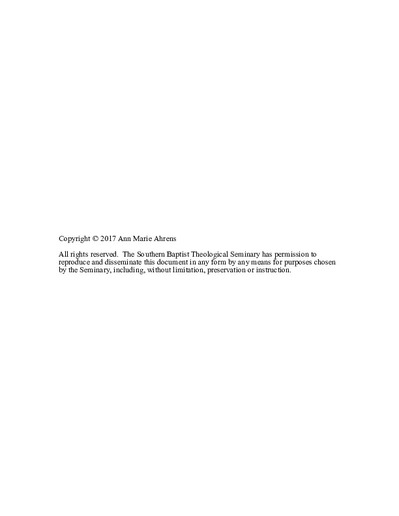Suffering, Soul Care, and Community: The Place of Corporate Lament in Evangelical Worship
Subject
Public worship in the BibleLaments in the Bible
Bible. Psalms--Relation to the New Testament
Abstract
ABSTRACT
SUFFERING, SOUL CARE, AND COMMUNITY: THE PLACE OF CORPORATE LAMENT
IN EVANGELICAL WORSHIP
Ann Marie Ahrens, Ph.D.
The Southern Baptist Theological Seminary, 2017 Chair: Dr. Esther R. Crookshank
This dissertation examines the biblical foundations of corporate lament practices beginning with the worship of ancient Israel as found in the Psalms, and their continued use by Jesus in his prayers, the gospel writers, and in the epistles of Paul, Peter, and John in the Revelation. It concludes with case studies and recommendations for the inclusion of lament practices in modern corporate worship.
Chapter 1 is a chronological literature review beginning ca. 1980, which demonstrates the increase in worship resources, particularly in the last decade, that focus on corporate lament practices. Resources are categorized as follows: (1) biblical and theological studies; (2) practical theology; (3) psychology and soul care; (4) liturgical resources for lament; and (5) corporate worship and the use of the arts. Scholarly and non-scholarly sources are included.
Chapter 2 examines the language and theology of lament in the Old Testament, with specific focus on the Psalms. J. L. Austin’s “Speech Act Theory” is also discussed and applied the lament Psalms in order to broaden the understanding of the rich dialogical nature of Israel’s corporate worship practices.
Chapter 3 examines the prayers of Jesus and how his use of the lament Psalms serves as a model for modern believers. Chapter 4 applies Rebekah Eklund’s typology of “echoes and extensions” of the lament Psalms in the writings of Paul, Peter, and John in
the Revelation. The goal is to demonstrate that use of the lament Psalms continued after the coming of Christ.
Chapter 5 contains a summary of conclusions and undergirding premises for the use of lament Psalms in modern corporate worship. The chapter concludes with foundational considerations for implementing these premises into corporate worship practices.
Chapter 6 includes four contemporary case studies in which the Psalms of lament are used to pray through and process times of tragedy and suffering. These case studies include personal, corporate, devotional, and pastoral care examples. The chapter concludes with a brief examination of parallel studies and suggested areas for further study.

